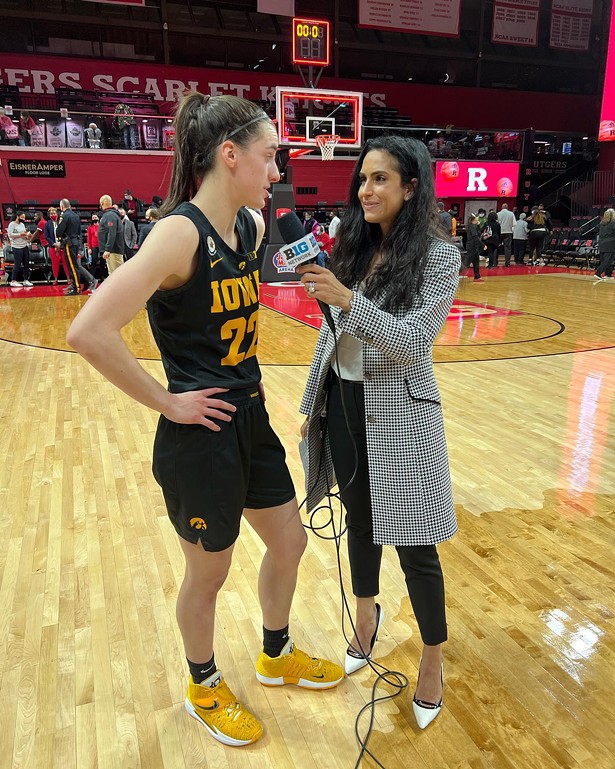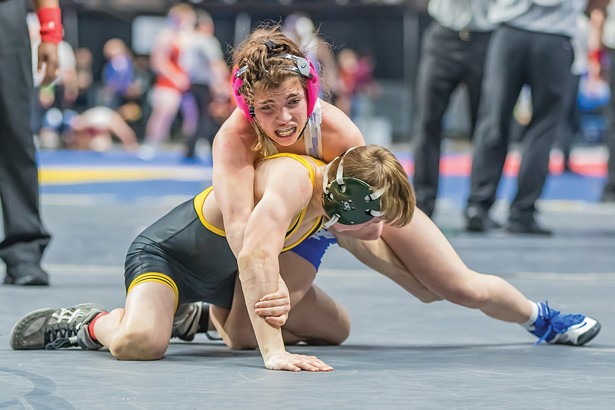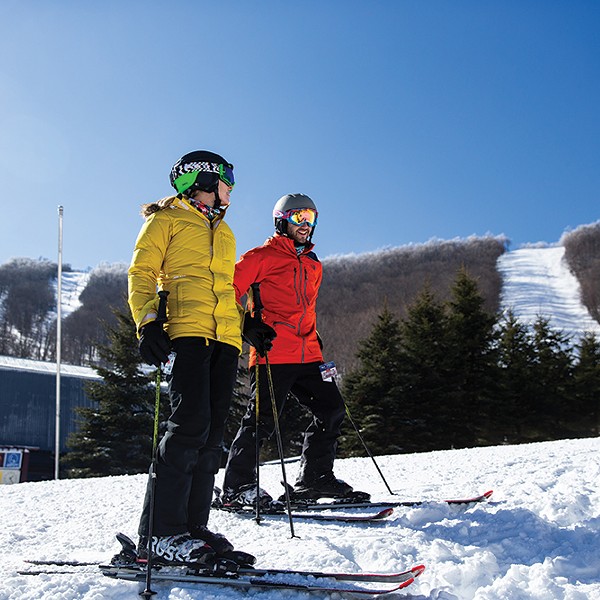"These girls don’t practice, they train,” says John Foley, head coach for the Port Jervis High School boys wrestling team. “They hang with the boys. They’re scrappy, they beat good boys—a lot of them—and they are state-caliber wrestlers.” The matter-of-fact tone of Coach Foley is not unlike other championship coaches—making it clear that he wants the best wrestlers for his squad. One of those athletes, among other girls, just so happens to be his niece, 14-year-old Charlie Wylie, who made history this past February by becoming the overall Section IX Regional Champion in her weight class.
For better and for worse, 2022 may go down in history as the year of the female, and by now you may have noticed that women in sports are having a moment—or should I say a movement. The United States women’s and men’s national soccer teams came to a collective bargaining agreement ensuring equal pay, investment in professional women’s sports leagues and clubs is at an all-time high (although still far behind the men), and the New York State Public High School Athletic Association (NYSPHSAA) announced this summer that both girls wrestling and flag football had met the criteria to be considered emerging sports—all in a year that marks the 50th anniversary of Title IX.
In its simplest terms, along with other equity laws, Title IX allows boys and girls the equal opportunity to participate in clubs, classes, and sports that receive federal assistance. The law also protects against sexual harassment and misconduct. It was quietly passed with little debate. Despite athletics and sports not being explicitly written into the law, it wouldn’t take long for a country already so enamored by sports to use the law to level the playing field.
Grappling with Change
Perhaps one of the most exciting developments happening at the scholastic level is the rise of girls wrestling, and the Hudson Valley has champions of its own. One of those is Charlie Wylie. After learning the art of Brazilian ju -jitsu, Wylie started wrestling when she was just seven years old. Wrestling in the lowest high school weight class at 102 pounds, when she isn’t wrestling outside of school, Wylie trains and competes for the Port Jervis High School boys team.Given the opportunity as an eighth grader, it didn’t take long for her to feel success on the mat competing against boys, and her championship this past February was a first in the state of New York. While winning is still sweet, Wylie, like her male (and female) teammates, just wants the opportunity to compete, “I’ve been wrestling my whole life and I knew that I wanted to wrestle for my school. Wrestling is everything. I practice as much as possible because winning is the best feeling.” Yet, after learning about Title IX for the first time, she expressed a similar sentiment as other girls across the nation. “I would definitely be upset if I couldn’t compete and wouldn’t think that’s fair at all. If that law wasn’t made, I wonder if I would even be wrestling right now.”
This school year will mark the first season that all-girls wrestling teams (and girls flag football) will have their own regional tournaments, but a state tournament to bring home a title is still years away. The emerging regional competition (four teams in four sections) is an important step to creating awareness and garnering enough interest to form more girls teams in districts across the state to eventually become an NYSPHSAA sanctioned sport. Section IX has six girls wrestling teams in the Hudson Valley, while Section I reports having no female wrestling teams.
It’s worth noting that the NYSPHSAA wrestling milestone was not a result of a Title IX complaint, but like the early days leading up to the passage of the law, it was a true grassroots effort that began seven years ago when a frustrated local mother and former student-athlete, Nikki Macaluso, started the NYS Girls Wrestling Task Force. “I was a soccer mom, married to a wrestler, with daughters who wrestled, so I formed a committee and surrounded myself with like-minded people in the world of wrestling.” Not only were the Macaluso’s daughters, Mia and Sofia, products of Section IX’s wrestling powerhouse, Minisink High School, but they were integral to the school’s success. During the ‘21-‘22 school year, Sofia wrestled her way to the Division 1 Section Finals and made history when she was the first female to place third as a freshman. They both earned scholarships to wrestle for East Stroudsburg University in Pennsylvania and continue representing the United States—both all-female teams.
The Room Where It Happens
Title IX cut the turf for women and girls to thrive in all aspects of the school experience, allowing many to make a career out of something they love. And although women are still vastly underrepresented in athletic leadership positions, perhaps the stories of some of our own in the Hudson Valley will help us connect to our past and carry the torch into the future.Robbie Greene spent over 30 years in athletics and education before she retired in 2016 as superintendent for the Washingtonville School District. She credits the career opportunities she has had to her experiences on the field. “Because I was involved in athletics, I met so many people from various demographics and doors opened for me,” Greene says. She is quick to note that she was “first generation of coaches who benefitted from the creative work of the people before her.” Since the late `90s, Greene has also served on the New York State Public High School Executive Committee for Section IX.
Lisa Roloson, now principal at Union Vale Middle School, attended Highland High School (’97-’01) and up until 2019 she held the record in girls basketball for most career points at the school. Like Greene, Roloson’s scholastic opportunities gave her a chance to play at the college level at Brandeis. Now as a school leader and the mother to two girls, she understands the importance of the opportunities she had and wants young people, including her daughters, to feel the same. “Sports gave me confidence and resilience and had such a positive impact on my life that I knew I wanted that for my kids too,” says Roloson.

Julianne Viani-Braen graduated from Our Lady of Lourdes High School in Poughkeepsie, earning the 03-04 New York State Basketball Player of the Year, before leading the Marist Red Foxes to multiple NCAA appearances and historic first-round upsets. She is now a regular on the sidelines, covering both professional men’s and women’s sports as a journalist. “Sports were huge learning grounds for me in life,” Viani-Braen says. “Everything I learned molded me into the person I am and the mindset I have toward life. Title IX gave me the rightful opportunities to play sports that I may have otherwise never gotten!”
Born in Poughkeepsie, Karen Self and her family moved around quite a bit before landing back in Dutchess County, where she graduated from Franklin D. Roosevelt high school in 1987. During her senior year, a standout basketball and track athlete, Self led her team to the only girls state championship in women’s basketball history at her alma mater. In 2020, Self was inducted into the NYSPHSAA Hall of Fame in recognition of her athletic accomplishments. Self continues to give back to the next generation as a high school basketball coach and teacher in Arizona. “Sports completely shaped who I am,” says Self. “Now coaching for 30 years, there is a ripple effect, it affected me and now it’s affecting those who I have coached. Being able to find success and confidence through sport which would not have been available to me without Title IX.”
Renee Bostic, the Athletic, Wellness, and Recreation Director for SUNY New Paltz, brings an impressive resume to the Hudson Valley and not only is she the first female in this role at the school, but she is also the first female of color to lead the department. A Queens native, she played basketball outside of school and when it was offered in school, she jumped at the opportunity. “Basketball was at the forefront of most of the things I did and in high school I also played soccer, tennis, and ran track. Going to college, it was all about having an opportunity; I wanted to attend an institution that would support me academically and give me an opportunity to compete on a successful team.”
She was awarded an athletic scholarship and attended the College of the Holy Cross (’92-96), where she appeared in the NCAA Tournament twice during her college career. When thinking about Title IX, Bostic doesn’t take her role lightly and acknowledges the hard work that had been done by the time she was playing. “I didn’t feel the effects of Title IX until I became an administrator, and we started talking about it. I understand that I am here because I am standing on the shoulders, necks, backs, and knees of other people who came before me.”
The Fight Continues
There is no doubt that progress has been made, but Title IX has yet to deliver equal opportunity for all, including to both the BIPOC women and LGBTQ+ communities. Bostic is in a position that, according to the Women’s Sports Foundation, makes up only four percent of college athletic directors in the nation. “I became a college basketball coach because when I was a student-athlete I never had a chance to play for someone that looked like myself,” Bostic says. “Becoming an administrator was another opportunity for me to be an example, to sit in the seat so that people who looked at me could see someone else who looked like them in that position.”Today, perhaps one of the most highly publicized Title IX issues is the impact of transgender students participating on female teams. “In New York, we have worked with state officials to allow the schools to determine the best team to permit participation on behalf of the student,” says NYSPHSAA Executive Director Dr. Robert Zayas.
Before she arrived at SUNY New Paltz, Bostic noted that the athletic department had already begun talking about what more could be done to ensure “we were continuing our mission of being an open and inclusive community” resulting in a Transgender Participation Committee which includes coaches and administrators. As it stands now, the university will continue to follow the NCAA policy that is “ever-evolving and transgender athletes will have the opportunity to be recruited to the institution to participate in varsity athletics.”
On the anniversary of Title IX in June, the US Department of Education proposed a new set of rules to the law to ensure that Title IX is doing what it set out for in 1972. The rules would clarify protections from discrimination and harassment based on gender identity.
Keep the Flame Burning
Title IX is an education law at its core, but you rarely hear it mentioned without the physical part of education. Zayas even wrote a dissertation on the subject. “High school sports are an extension of the classroom. Life-long lessons are taught to students on the playing field and courts that can’t be duplicated in any other area of education,” Zayas says. “Research continues to provide evidence of the benefits of participation; students get better grades, attend school at a greater rate, and have fewer discipline issues when compared to their non-participating classmates.”Sports and play put people in situations to learn perseverance, gain confidence, feel success, and fail forward through life. To Charlie and millions of other girls, a pre-Title IX time may seem like a fairy tale, but according to Karen Self, this is the very reason why it is important to continue talking about it. “As time goes by, if we don’t continue the conversation we may slip in terms of equal access. The work of others opened doors and it’s up to us to keep the flame burning.”















